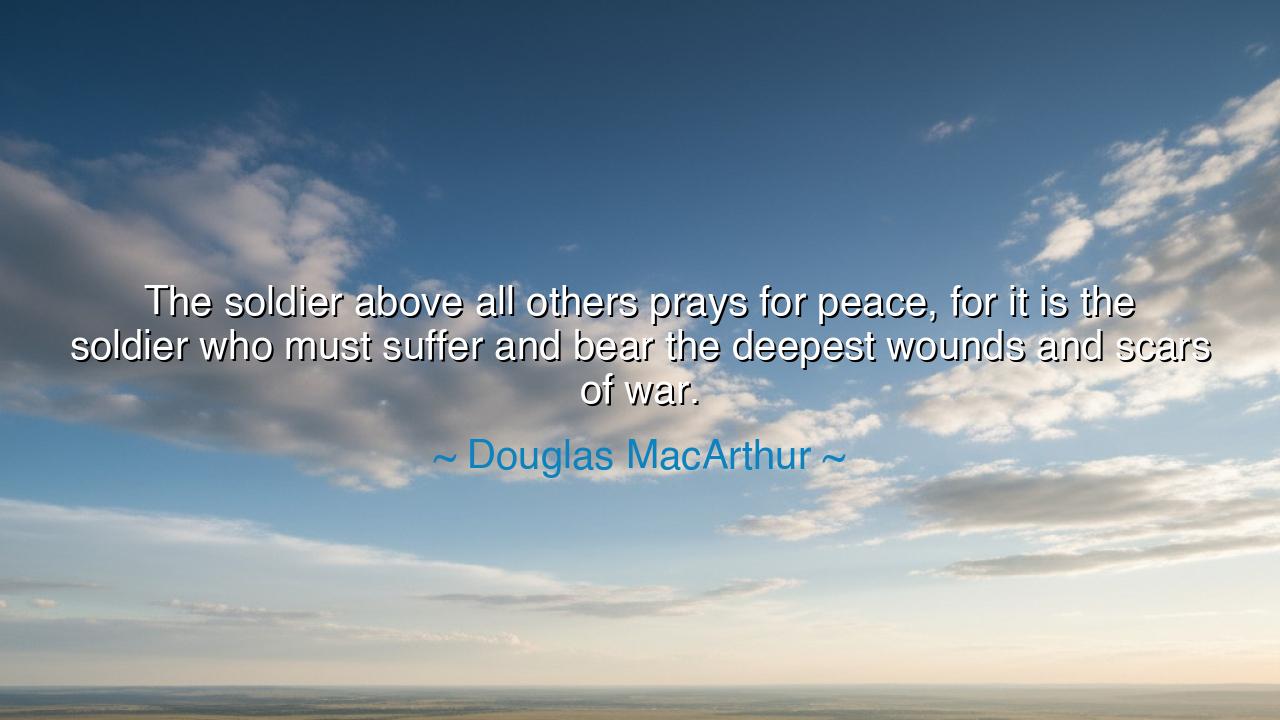
The soldier above all others prays for peace, for it is the
The soldier above all others prays for peace, for it is the soldier who must suffer and bear the deepest wounds and scars of war.






The words of Douglas MacArthur — “The soldier above all others prays for peace, for it is the soldier who must suffer and bear the deepest wounds and scars of war.” — resound like a solemn hymn carved into the stone of history. They remind us that those who march into battle do not do so with a thirst for blood, but often with a longing for the very opposite — for the end of strife, for the quiet of the fields, for the return to hearth and home. The world may glorify the clash of arms, but the soldier, who knows war’s weight upon his body and soul, understands more than any other the preciousness of peace.
MacArthur, himself forged in the crucible of the First and Second World Wars, spoke not from the detachment of theory but from the bitter knowledge of command. He had seen men fall by the thousands, their lives cut short in the mud of battlefields, their laughter silenced, their hopes buried beneath the roar of artillery. He knew that while kings and politicians might speak of glory, it is the soldier who pays the price. His words are the lament of one who had witnessed the cost and understood that war carves its deepest scars into those who serve on the front lines.
History itself provides countless illustrations. Consider the veterans of World War I, the so-called “Lost Generation.” They returned from the trenches not triumphant, but broken in body and spirit, haunted by the endless barrages, by the gas that seared their lungs, by the memories of comrades torn apart before their eyes. These men, once young and full of promise, carried wounds invisible to the world — a grief and exhaustion so deep that many could no longer speak of it. To them, the truest prayer was not for victory, but for peace that would free humanity from repeating such horror.
And yet, the paradox is that it is often the soldier, trained for war, who cries most fervently for its absence. For he knows what the untested cannot imagine. He has felt the ground tremble beneath shells, heard the cries of the dying, and seen the futility of endless conflict. It is easy for distant voices to demand aggression, but the soldier who has walked through fire knows that no prize can ever equal the cost. Thus, the one most prepared for war is also the one most desperate for peace.
There is a heroic tenderness in this truth. To pray for peace is not weakness but strength, for it requires greater courage to lay down arms than to wield them. The soldier, bearing the burden of sacrifice, does not diminish his valor by seeking peace; rather, he ennobles it. His scars are not only reminders of pain but also symbols of wisdom, teaching future generations that the highest victory is not over the enemy, but over the cycle of endless conflict.
The lesson for the generations is clear: listen to those who have borne the heaviest burdens. When a soldier prays for peace, honor his words, for they rise from the depths of lived experience. Do not glorify war in ignorance, nor call for battle lightly, for every command carries the cost of human suffering. True strength lies not in the readiness to destroy, but in the discipline to seek reconciliation, and in the courage to protect life rather than to squander it.
In practice, let each listener carry forward this wisdom. Support veterans not with words alone but with care, understanding, and gratitude. Work within your own life to resolve conflict with patience rather than anger. Teach your children that honor is found not in conquest but in compassion, not in the scars of war but in the healing power of peace. For though the soldier may carry the scars, it is the duty of all humanity to ensure those scars need not be passed on to future generations.
Thus MacArthur’s words endure as both warning and blessing: that those who know the ravages of war are the very ones who treasure peace most dearly. Let us honor their sacrifice not by repeating their suffering, but by heeding their prayer. For the greatest monument we can raise to the soldier is not a statue of stone, but a world where peace reigns, and no more sons and daughters must march into the fire.






AAdministratorAdministrator
Welcome, honored guests. Please leave a comment, we will respond soon